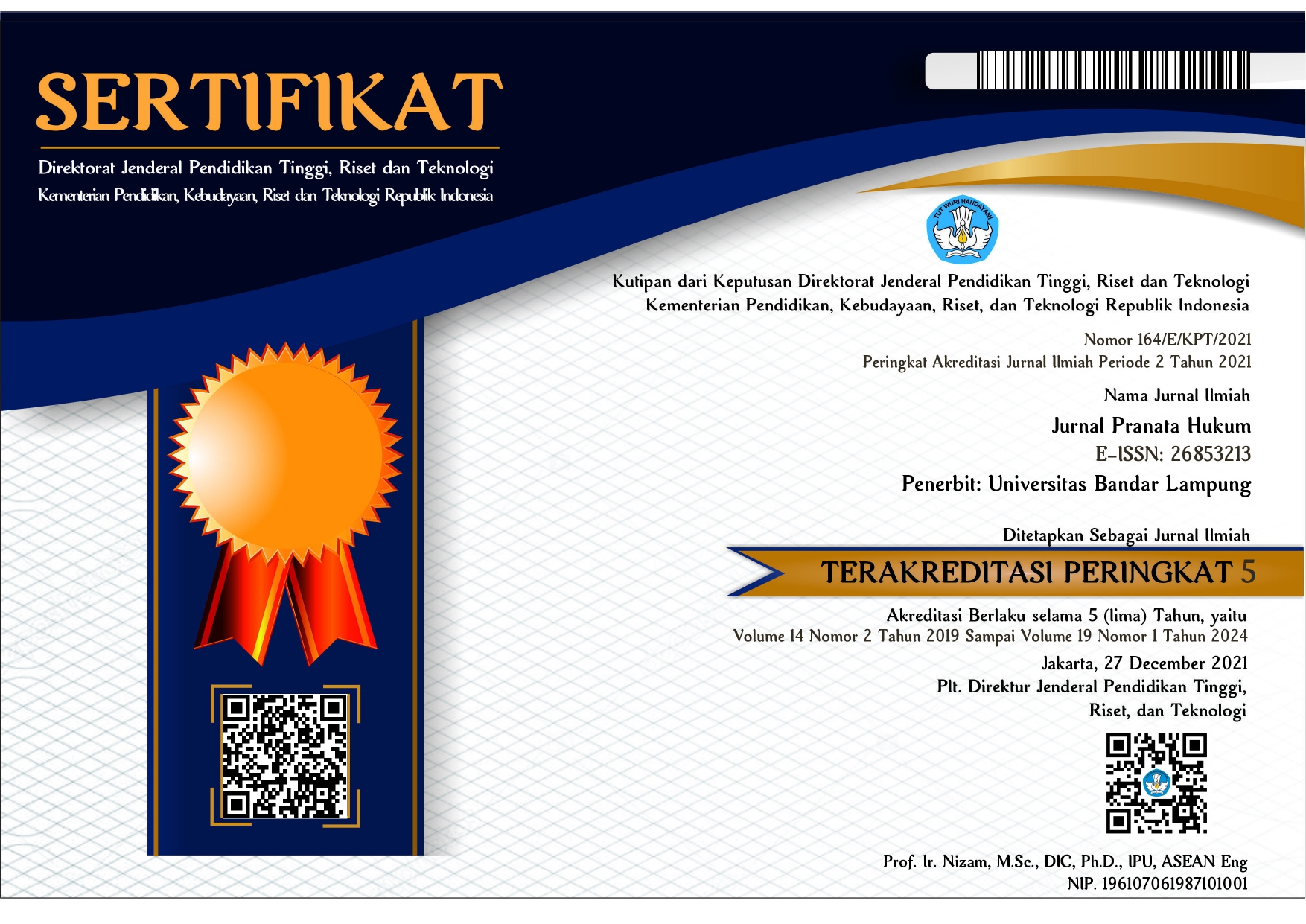MORAL LAW AND JUSTICE IN DRUG ABUSE REHABILITATION
DOI:
https://doi.org/10.36448/pranatahukum.v20i2.414Keywords:
Legal Review, Criminal OffensesAbstract
Law as a social phenomenon is a reality of social life, or in other words, all forms of human relationships within society, whether they conform to human norms or rules of life or are prohibited, are described in law. Therefore, it can be said that what is established in law serves as a standard for governance and prohibitions in human life within society, aimed at creating a just, orderly, and prosperous life, thereby fostering a safe and happy existence. This situation can be seen specifically in the description of the national legal system, where the government of the Republic of Indonesia, since its independence, has sought to establish a national legal system to create a clean and authoritative state, so that the objectives of the Republic of Indonesia as stated in the 1945 Constitution 1945 Constitution to create a just and prosperous society, both materially and spiritually, will be achieved. The method used to analyze the problem will employ a descriptive research approach through library research and field research, utilizing data collection techniques such as interviews and document studies. Once the data is collected, it will be tested using deductive and inductive testing techniques. From the data generated in the research, it is evident that the factors causing criminal acts are to assist in committing criminal acts to obtain rewards in the form of goods or objects and/or destruction due to the intimate relationship with the perpetrator and/or revenge against the victim.
Downloads
References
Amin, Subhan. “Keadilan Dalam Perspektif Filsafat Hukum Terhadap Masyarakat.” Jurnal Pemikiran Dan Tafsir Hadis Vol. 8, no. No. 1 (2018).
Arief, Barda Nawawi. Kapita Selekta Hukum Pidana. Bandung: PT Citra Aditya Bakti, 2003.
Artadi, Ibnu. “Hukum: Antara Nilai - Nilai Kepas Tian, Kemanfaatan Dan Keadilan.” Hukum Dan Dinamika Masyarakat, Vol. 1, no. No. 1 (2006).
Azwar, Sarifuddin. Metode Penelitian. Yogjakarta: Pustaka Pelajar, 1998.
Bakir, Herman. Filsafat Hukum Desain Dan Arsitektur Kesejarahan. Jakarta: Refika Aditama, 2009.
Fajar, Mohamad. “Penerapan Rehabilitasi Medis Dan Rehabilitasi Sosial Atas Penyalahgunaan Narkotika Bagi Diri Sendiri.” Jurnal Sosial dan Teknologi, Vol. 2, no. No. 5 (2022).
Fithriat dan Oksep Adhayanto Shal. “Hukum Moral Dan Kekuasaan Dalam Telaah (Hukum Adalah Alat Teknis Sosial).” Fiat Justisia Jurnal Ilmu Hukum Vol. 10, no. No. 4 (2016).
Hujibers, Theo. Filsafat Hukum Dalam Lintas Sejarah. Yogyakarta: Kanisius, 1986.
Khudzaifah, Dimyati. Hukum Dan Moral. Yogyakarta: Genta Publishing, 2018.
Law No. 35 of 2009 on Narcotics
Mertokusumo, Sudikno. Bab-Bab tentang Penemuan Hukum. Bandung: Citra Adytia Bakti, 1993.
Mustofa, Bachsan. Sistem Hukum Administrasi Negara Indonesia. Bandung: Citra Adytia Bakti, 2001.
National Narcotics Agency Regulation Number 6 of 2022 concerning the Implementation of Continuous Rehabilitation.
Rinaldi, Kasmanto. Dinamika Kejahatan Dan Pencegahnnya. Malang: Ahlimedia Press, 2022.
Santoso, Agus. Hukum Moral Dan Keadilan. Jakarta: Kencana, 2014.
Sari, Novita. “Penerapan Ultimum Remedium Dalam Penegakan Hukum Tindak Pidana Penyalahgunaan Narkotika.” Jurnal Penelitian Hukum De Jure, Vol. 17, no. No. 3 (2017).
Sutrisno, Fenty Fuluhulawa, lasiana margaretha Tijow. “Penerapan Asas Keadilan, Kepastian Hukum Dan Kemanfaatan Dalam Putusan Hakim Tindak Pidana Korupsi.” Gorontalo Law Review, Vol. 3, no. No. 2 (2020).
Downloads
Published
Issue
Section
License
Copyright (c) 2025 PRANATA HUKUM

This work is licensed under a Creative Commons Attribution-ShareAlike 4.0 International License.
All articles published in the Pranata Journal are licensed under the Creative Commons Attribution-ShareAlike 4.0 International License (CC BY-SA 4.0). This license allows others to share, copy, distribute, adapt, and build upon the work, even for commercial purposes, as long as appropriate credit is given and derivative works are licensed under the same terms.




